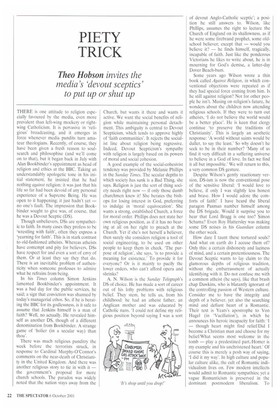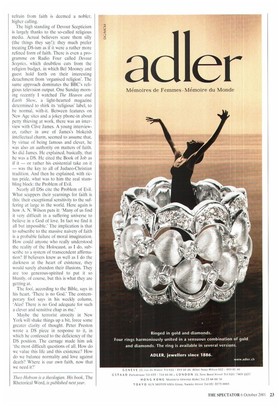PIETY TRICK
Theo Hobson invites the media's 'devout sceptics' to put up or shut up
THERE is one attitude to religion especially favoured by the media, even more prevalent than left-wing mockery or rightwing Catholicism. It is pervasive in 'religious' broadcasting, and it emerges in force whenever media pundits turn amateur theologians. Recently, of course, they have been given a fresh reason to soulsearch and philosophise (and we'll come on to that), but it began back in July with Alan Bookbinder's appointment as head of religion and ethics at the BBC. Taking an understandably apologetic tone in his initial statement, he insisted that he had nothing against religion; it was just that his life so far had been devoid of any personal experience of a Supreme Being. He was open to it happening; it just hadn't yet — no one's fault. The impression that Bookbinder sought to give was, of course, that he was a Devout Sceptic (DS).
Though unbelievers, DSs are sympathetic to faith. In many cases they profess to be 'wrestling with faith', often they express a 'yearning for faith'. This is in stark contrast to old-fashioned atheists. Whereas atheists have contempt and pity for believers, DSs have respect for and even a sort of envy of them. Or at least they say they that do. There is an inevitable problem of authenticity when someone professes to admire what he refrains from being.
In his Times column Simon Jenkins lamented Bookbinder's appointment. It was a bad day for the public services, he said; a sign that conviction was shunned by today's managerial ethos. So, if he is berating the BBC for its godlessness, is it safe to assume that Jenkins himself is a man of faith? Well, no actually. He revealed himself as another DS, though of a different denomination from Bookbinder. A strange game of 'holier (in a secular way) than thou'.
There was much religious punditry the week before the terrorists struck, in response to Cardinal Murphy-O'Connor's comments on the near-death of Christianity in the United Kingdom. And there was another religious story to tie in with it — the government's proposal for more church schools. The paradox was widely noted that the nation stays away from the Church, but wants it there and wants it active. We want the social benefits of religion while maintaining personal detachment. This ambiguity is central to Devout Scepticism, which tends to approve highly of 'faith communities'. It rejects the socialist line about religion being regressive. Indeed, Devout Scepticism's sympathy with religion is largely based on its powers of moral and social cohesion.
A good example of the social-cohesivist tendency was provided by Melanie Phillips in the Sunday Times. The secular depths to which society has sunk is a Bad Thing, she says. Religion is just the sort of thing society needs right now — if only those dumb churchmen knew it! She berates the bishops for losing interest in God, preferring to indulge in 'moral equivocation'. She wants a strong, established Church, a force for moral order. Phillips does not state her own religious position, as if it has no bearing at all on her right to preach at the Church. Yet if she's not herself a believer, then surely she considers religion a tool of social engineering, to be used on other people to keep them in check. 'The purpose of religion', she says, 'is to provide a meaning for existence.' To provide it for everyone? Or is it mainly to pacify the lower orders, who can't afford opera and shrinks?
A. N. Wilson is the Sunday Telegraph's DS of choice. He has made a sort of career out of his lofty problems with religious belief. They stem, he tells us, from his childhood: he had an atheist father, an Anglican mother and was educated by Catholic nuns. 'I could not define my religious position beyond saying I was a sort of devout Anglo-Catholic sceptic'; a position he still answers to. Wilson, like Phillips, assumes the right to lecture the Church of England on its shallowness, as if he were some firebrand prophet, some oldschool believer; except that — would you believe it? — he finds himself, tragically, incapable of faith. Just like the ponderous Victorians he likes to write about, he is in mourning for God's demise, a latter-day Dover Beach-bum.
Some years ago Wilson wrote a thin book called Against Religion, in which conventional objections were repeated as if they had special force coming from him. Is he still against religion? Not for other people he isn't. Musing on religion's future, he wonders about the children now attending religious schools. If they were to turn out atheists, 'I do not believe the world would be a better place'. He is keen that clergy continue `to preserve the traditions of Christianity'. This is largely an aesthetic response: 'A world without saints would be duller, to say the least.' So why doesn't he seek to be in their number? 'Many of us find it very difficult in a suffering universe to believe in a God of love. In fact we find it all but impossible.' We will return to this, a very common DS gesture.
Despite Wilson's gently reactionary version, DS-ism is now the conventional pose of the sensitive liberal: 'I would love to believe, if only I was slightly less honest and brave. How I would adore the comforts of faith!' I have heard the liberal paragon Paxman number himself among the DS brigade. Would it surprise you to hear that Lord Bragg is one too? Simon Schama? Even Roy Hattersley was making some DS noises in his Guardian column the other week.
How dare I taunt these tortured souls? And what on earth do I accuse them of? Only this: a certain dishonesty and laziness of mind, and a certain pretentiousness. The Devout Sceptic wants to lay claim to the glamorous depths of religious tradition, without the embarrassment of actually identifying with it. Do not confuse me with a common atheist (he says), like that brash chap Dawkins, who is blatantly ignorant of the controlling passion of Western culture. Consider me to have the integrity and depth of a believer, yet also the searching mind and defiant heart of a Romantic. Their text is Yeats's apostrophe to Von Hugel (in `Vacillation'), in which he announces his heroic incapacity for faith: 'I — though heart might find relief/Did I become a Christian man and choose for my belief/What seems most welcome in the tomb — play a predestined part./Homer is my example and his unchristened heart.' Of course this is merely a posh way of saying, 'I did it my way'. In high culture and popular culture alike, the cult of Romantic individualism lives on. Few modern intellects would admit to Romantic sympathies; yet a vague Romanticism is preserved in the dominant postmodern liberalism. To
refrain from faith is deemed a nobler, higher calling.
The high standing of Devout Scepticism is largely thanks to the so-called religious media. Actual believers scare them silly (the things they say!); they much prefer treating DS-ism as if it were a rather more refined form of faith. There is even a pro gramme on Radio Four called Devout Sceptics, which doubtless eats from the religion budget, in which Bel Mooney and guest hold forth on their interesting detachment from 'organised religion'. The same approach dominates the BBC's reli gious television output. One Sunday morn ing recently I watched The Heaven and Earth Show, a light-hearted magazine determined to shirk its 'religious' label, to be normal, with-it. Between features on New Age sites and a jokey phone-in about petty thieving at work, there was an inter view with Clive James. A young interviewer, rather in awe of James's bloke ish intellectual charm, seemed to assume that, by virtue of being famous and clever, he was also an authority on matters of faith.
So did James. He explained, basically, that he was a DS. He cited the Book of Job as if it — or rather his existential take on it — was the key to all of Judaeo-Christian tradition. And then he explained, with rictus pride, what was to him the real stumbling block: the Problem of Evil.
Nearly all DSs cite the Problem of Evil. What scuppers their yearnings for faith is this: their exceptional sensitivity to the suf fering at large in the world. Here again is how A. N. Wilson puts it: 'Many of us find it very difficult in a suffering universe to believe in a God of love. In fact we find it all but impossible.' The implication is that to subscribe to the massive naivety of faith is a probable failure of moral imagination. How could anyone who really understood the reality of the Holocaust, as I do, sub scribe to a system of transcendent affirmation? If believers knew as well as I do the darkness at the heart of existence, they would surely abandon their illusions. They are too generous-spirited to put it so bluntly. of course, but this is what they are getting at.
The fool, according to the Bible, says in his heart, 'There is no God.' The contem porary fool says in his weekly column, 'Alas! There is no God adequate for such a clever and sensitive chap as me.'
Maybe the terrorist atrocity in New York will shake things up a bit, force some greater clarity of thought. Peter Preston wrote a DS piece in response to it, in which he confessed to the deficiency of the DS position. The carnage made him ask 'the most difficult questions of all. How do we value this life and this existence? How do we balance normality and love against death? Where is our own faith, now that we need it?'
Theo Hobson is a theologian. His book, The Rhetorical Word, is published next year.



































































































 Previous page
Previous page